John Macpherson Collection (6 vols.)
Digital Logos Edition
Overview
John Macpherson was an author, a translator, and a Presbyterian minister. The John Macpherson Collection brings together six of his most important works on theology, doctrine, and Scottish church history. In Christian Dogmatics, Macpherson gives a systematic presentation of all the leading Christian doctrines through the lens of “moderate Calvinism.” In History of the Church in Scotland, he traces Scotland’s ecclesiastical and religious movements from the original planting of Christianity to the close of the nineteenth century. He provides invaluable notes and commentary in The Sum of Saving Knowledge, a practical guide to the doctrine contained in the Westminster Confession of Faith. Also included is Macpherson’s highly lauded commentary on Ephesians, a collection of lectures on Scottish theology, and Macpherson’s handbook on the Presbyterian Church.
In the Logos Bible Software edition, all Scripture passages in the John Macpherson Collection are tagged to appear on mouseover. For scholarly work or personal Bible study, this makes these resources more powerful and easier to access than ever before. Perform powerful searches by topic or Scripture reference—finding, for example, every mention of “resurrection” or “Mark 9:2.”
This title is included in the following collections
You can save when you purchase this product as part of a collection.
2025 Reformed Gold
$849.99$679.992025 Reformed Platinum
$1,499.99$1,199.99Logos 8 Reformed Platinum Lega...
$1,499.99$1,499.99Logos 9 Reformed Platinum Lega...
$1,499.99$1,499.99
- $2,999.99$2,249.99
- $2,999.99
- $2,999.99
- $4,749.99$3,562.49
- $4,749.99
- $4,749.99
- $23,999.99$17,999.99
- $21,749.99
- $24,999.99

Key Features
- Macpherson’s Christian Dogmatics and Commentary on St. Paul’s Epistle to the Ephesians
- Important works on Scottish church history and theology
Product Details
- Title: John Macpherson Collection
- Volumes: 6
- Pages: 1,185
Individual Titles
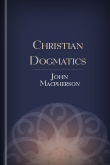
In Christian Dogmatics, John Macpherson gives a systematic presentation of all the leading doctrines of the Christian faith. The standpoint is that of a moderate Calvinism. The history of the dogmas has been introduced only insofar as it’s necessary for the clear and intelligible statement of the positive doctrine. Macpherson provides lists of literature at the head of several sections, leading readers to treatises and works that are distinctly helpful in the discussion of those section’s subjects. The introduction is a helpful preface to the systematic study of Christian doctrine. Christian Dogmatics is divided into the following seven sections:
- Introduction
- Doctrine of God and the World
- Doctrine of Man and Sin
- The Doctrine of Redemption
- Application of Redemption
- The Means of Grace
- The Last Things
The book is never heavy. It is written in a scholarly style, clear, full, restrained, judicious, and it is a work which every minister will do well to get on his shelves and to read and re-read.
—London Quarterly Review
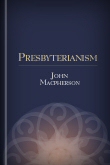
In the introduction to Presbyterianism, John Macpherson explains the various forms of church polity, the distinctive principles of Presbyterianism, the divine right of Presbytery, and the literature of Presbyterianism. The book is then divided into two parts: “Office and Office-Bearers in the Presbyterian Church,” where Macpherson defines the roles of elders, teachers, and deacons; and “Constitution and Gradation of Courts in the Presbyterian Church,” in which the functions of the several church courts are examined.
It would be well if every officer and intelligent member of our Church would read this book.
—The Presbyterian Review
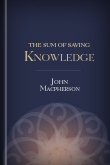
“The Sum of Saving Knowledge” is a short treatise on Christian doctrine that was attached to the Westminster Confession of 1646. It is a practical application of the doctrine of the Confession. This volume contains the treatise, along with commentary and notes by John Macpherson. As he states in the introduction, “For those who may be somewhat doubtful as to the effect of strictly doctrinal summaries on the spiritual condition of our youth, it may be interesting to learn that M’Cheyne attributes his first clear perception of the way of salvation to the reading of this treatise.” M’Cheyne’s diary of March 11, 1834, has this entry: “Read in ‘The Sum of Saving Knowledge,’ the work which I think first of all wrought a saving change in me.”
The type of doctrine here presented is precisely the same as that set forth in the Westminster Confession. Macpherson has in his notes entered into detailed exposition of the earlier sections, where historical references are helpful; while in the later sections, which do not call for such treatment, he has confined himself to short, explanatory notes.
In four chapters Mr. Macpherson gives a clear, concise summary of saving truth. The arguments for the Being of God are forcibly put in small compass, and general readers will find the definitions and explanations of considerable value.
—London Quarterly Review
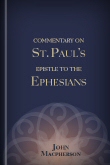
In the Epistle to the Ephesians we have the most mature and sustained of all the statements of Christian doctrine which have come down to us from the hand of the great apostle. In almost all his other epistles Paul is now and again, and in some of them very frequently, carried away form the particular argument which he is pursuing, in order to deal with matter of local or temporary interest to his immediate readers. But in this epistle he goes on to utter forth uninterruptedly all that has taken possession of his own mind, in reference to those matters of faith and duty which must always be of utmost concern to the members of Christ’s body, who, while living upon earth, seek to have their conversation in heaven.
“A commentary on such an epistle ought to be exegetical,” writes Macpherson in the Preface. He deals with all questions of textual and grammatical criticism where they arise, in so far as these seem of importance in elucidating the particular and precise meaning of the passages in which they occur. Yet, he also gets at the heart and truth of the epistle. “It is the task of the expositor to make everything contribute to the elucidation of those great truths, with regard to the Christian creed and conduct, which the apostle here lays down for the instruction of those who no longer need to be fed on milk nor to be taught again what are the first principles of the oracles of God.”
Mr. Macpherson has some of the most serviceable gifts which the interpreter of an Epistle like this requires. He has spent years of devoted labor on this profound composition, and his book is a solid and honest piece of work.
—Critical Review of Theological and Philosophical Literature
The work before us may be confidently pronounced a careful and valuable addition to the literature on this remarkable epistle.
—Presbyterian and Reformed Review
It is an advance, and a great one, on anything we yet possess. The author goes to the root, and neglects nothing that usually comes under the eye of a careful student. Besides all this, the book is a living book. One is conscious of the heart of a man in it, as well as the brains.
—Methodist Times
This is a very handsome volume which Mr. Macpherson has given us, and without any doubt it will take the first place among the commentaries devoted to this epistle.
—Expository Times
We are not acquainted with another work on this great epistle so intellectually searching and exhaustive. It will be a boon to all teachers and a book that no student can afford to neglect.
—Review of the Churches
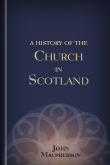
History of the Church in Scotland gives a comprehensive account of the ecclesiastical and religious movements in Scotland from the original planting of Christianity to the close of the nineteenth century. Avoiding as far as possible details of civil history, attention has been given to Acts of Parliament and contrivances of statesmen only in so far as these have affected the interest of the Church in regard to its government and constitution. Macpherson deals faithfully and generously with the memories of the great men who in all the various divisions of the Church of Scotland have contributed to the theological literature and to the religious life of the country.
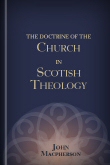
The Doctrine of the Church in Scottish Theology consists of six lectures given by John Macpherson, originally delivered in successive sessions to the United Free Colleges of Edinburgh and Aberdeen. Lectures include:
- The Scottish Theology—Its Literature and Its Distinctive Characteristics
- The Idea of the Church and Membership in It
- Church Unity—The Sin of Schism
- Church Purity—Censures and Excommunication
- Church Power—The Jurisdiction Claimed
- What According to Scottish Theology Is of Divine Right
We rise from the perusal of the volume with a quickened sense of the wisdom, learning, and noble constancy of our Scottish forefathers in their defense of the fundamental Reformed doctrine of the Church.
—Princeton Theological Review
About John Macpherson
John Macpherson (1847–1902) was educated at King’s College, Aberdeen, and at the University of Edinburgh. He served as a pastor at Findhorn, a fishing village in Morayshire. He was an author and notable translator of German Protestant works, including works by J. H. A. Ebrard, J. H. Kurtz, and Emil Schürer.